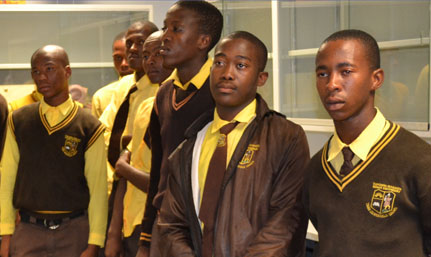|

|
|
Thokoana Makaota learners listening attentively during the launch of the partnership with the UFS.
Photo: Thabo Kessah
21 February 2013 |
The university’s quest for academic excellence in the education system paved the way for the Faculty of Education on the Qwaqwa Campus to enter into a mutually beneficial partnership with a local school, Thokoana Makaota Secondary.
This recently launched partnership will enable learners who are currently in grades 10-12 to attend supplementary classes on the campus.
“The aim of this partnership is to expose learners from the school to adequate tuition in subjects that are generally perceived as difficult. We want them to gain as much confidence as possible when tackling these subjects, therefore they will be using our well-equipped laboratories and classes”, said Dr Lekhooe Letsie, the Programme Coordinator.
“We will also benefit from this as our own final-year education students will act as tutors. This will help them gain confidence before they venture into the real job market next year,” Dr Letsie said.
Dr Letsie also revealed that the student-teachers will be closely monitored by their mentors to ensure maximum success.
The school’s Deputy Principal and UFS alumnus, Serame Sello, said that the school felt humbled by this gesture from the UFS.
“We are confident that this working relationship will yield very positive results for the school and enable us to improve on the 84% pass rate obtained in 2012,” Sello said.
“We did not do so well in the subjects that will be covered here. For instance, we obtained 43% and 61% in Physical Science and Mathematics respectively, but with this partnership we hope for improved results this year,” said Sello.
Other subjects to be covered include Geography, Life Sciences, Economics, and Accounting. The different grades will commute to and from campus on different afternoons.